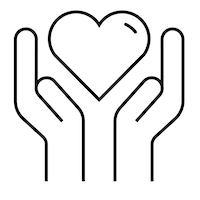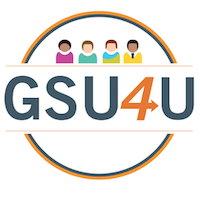Services Offered at the CWC
The Counseling and Wellness Center (CWC) offers a variety of services to GSU students. All services are at no additional cost to you (your student fees cover the cost of counseling) and all counseling and consultation services are confidential. For more information on each service we provide, or if you are interested in scheduling an appointment for counseling, please call 708-235-7334.

LivingWell
@GSU
LivingWell@GSU provides 24/7/365 counseling/support services. It is available anytime, anywhere, including off campus.
Learn More
Individual
Counseling
Individual Counseling is based on a short-term model (usually 6-8 sessions per semester) and focuses on helping you resolve or manage a current concern or working toward the change you desire. If your need requires expertise that is not available at CWC, a referral to community resources will be provided.

Group
Counseling
Group Counseling involves approximately 6-8 students meeting face-to-face with one or more group facilitators to discuss what concerns they are experiencing. Group counseling benefits include expressing your thoughts and feelings, listening to others, receiving feedback and support, and developing interpersonal skills.

Couples
Counseling
Couples Counseling is short-term and focuses on helping couples resolve conflict, communicate effectively, and other areas of concern. Couples Counseling is available to currently registered students, and only one partner needs to be a student at GSU.

Crisis
Services
Crisis Services are provided to all GSU students (non-client) and current clients who are experiencing acute emotional distress or trauma. The crisis service’s goal is to help students with their immediate stressors, reduce the emotional distress they are experiencing, and provide them with coping strategies to help them manage their mental health challenges, current crisis, as well as crisis they may experience in the future.

Case
Management
Case Management provides problem-solving support, resources and advocacy for external challenges that are impacting a student's personal and/or academic success. Case managers can assist you with applications for benefits like Medicaid, SNAP (formerly food stamps), and other resources. We can also help connect you with resources on campus for students who need emergency financial assistance, housing, food, or other basic needs.

Consultation
Consultation is offered to faculty, staff, and students who are seeking to help another person through difficult times. All information disclosed will be kept confidential.

GSU4U
GSU4U connects students facing personal difficulties, such as food and housing insecurity, to campus and community resources. We are dedicated to assisting all students, no matter how serious or small the situation may seem.
Learn More
What To Expect From Counseling
Counseling means sitting down with a counselor or in a group setting to talk about mental health issues (i.e., anxiety, depression, relationship concerns, etc.) to help you come to some resolution or satisfaction regarding concerns.
How do I set up a triage/walk-in appointment?
Attend a triage/walk-in appointment. You do not need to call before you come; just come to A-1120. You will complete about 5-8 minutes of paperwork and then meet with a counselor for approximately 30-40 additional minutes. The counselor will go over your paperwork, listen to your concerns and assess your needs. Some students who attend a triage/walk-in appointment are seen at the CWC for counseling, however, sometimes that student and counselor will determine together that there may be other services either on or off campus that are a better fit for their needs.
What do you talk about with a counselor?
GSU students come from many different backgrounds and walks of life. At the CWC, students have sought counseling to receive support for a number of concerns, including, but not limited to: relationship problems including family concerns, social issues, homesickness, or break-ups, feelings such as anger, worry, anxiety, sadness, depression, loneliness, suicide or guilt, personal habits and problems including abusing alcohol or drugs, sexual abuse or assault, body image and eating habits, perfectionism/procrastination or coping with stress and anxiety and identity and self-esteem concerns like issues of gender identity, sexual orientation, negative or self-defeating thinking, lack of confidence and difficulty adjusting to college.
How often do I meet with a counselor?
The CWC operates under a time-limited model of individual counseling, meaning students typically meet with a counselor around 6-8 sessions. However some students may meet longer (e.g., during their entire time at GSU), but some meet for fewer sessions depending on their needs. Students usually meet with their counselor once a week for 45-50 minutes.
Does anyone else have to know about me coming to counseling?
Counseling is confidential in nature, meaning we do not release or talk to anyone regarding the fact that counseling has been received or the nature of the concerns without written permission. However, therapists have a legal obligation for the safety of their clients. If a client is a danger to self or others (i.e, suicide or homicide), then it is the therapist’s legal responsibility to prevent harm; in these cases, others may be informed. Therapists are also obligated to report cases of child abuse and/or neglect as well as elder abuse and/or neglect. In these cases, reports are made to the proper state agency.
The counselor will tell you what to do and how to "fix" your problems
Counseling is not a “quick fix”cure to your problems. The counselor is there to help you explore your feelings, thoughts and concerns, to examine your options and to assist you in achieving your goals.
The counselor cannot understand you unless he/she has had similar experiences or is of the same background?
Counselors are trained to be sensitive to and respectful of individual differences, including the specific concerns of students with regard to gender, racial/ethnic, cultural, religious, age, sexual preferences/orientation, and socioeconomic issues.